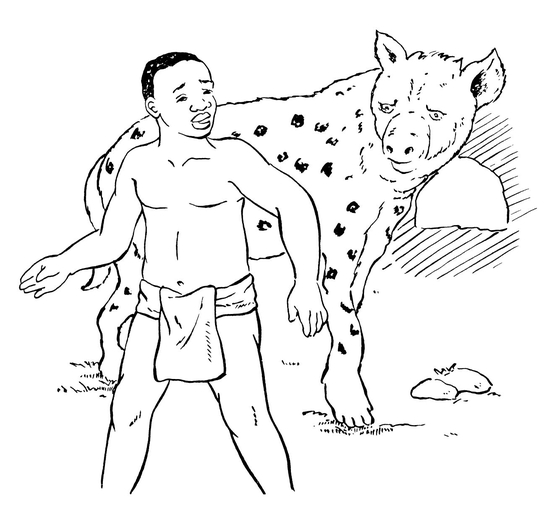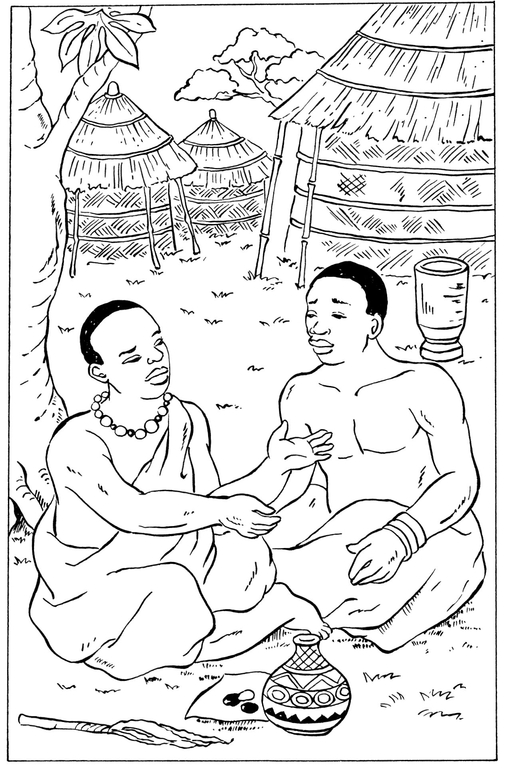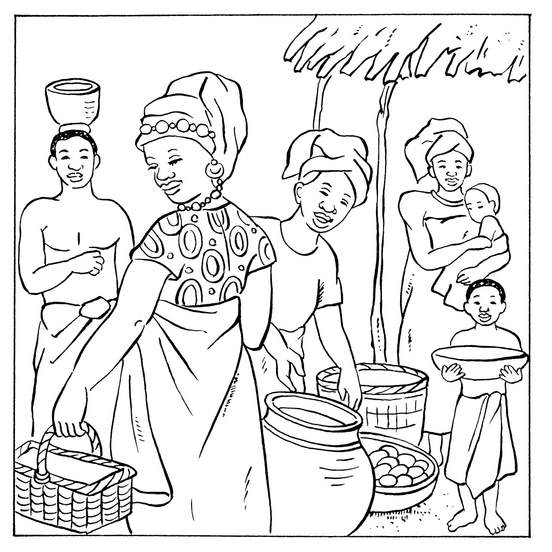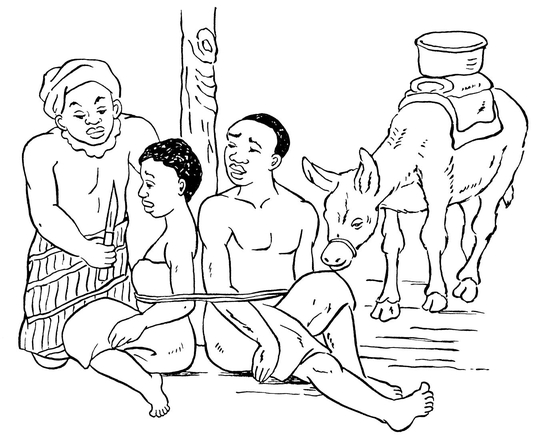Read African Folk Tales Online
Authors: Hugh Vernon-Jackson,Yuko Green
African Folk Tales (3 page)
O
NCE UPON A TIME there was a very large hyena who lived on a mountain. The hyena's dwelling-place was a cave in the mountain-side, and it was so big that a man could stand upright in it.
At the foot of the mountain was a village of farmers and their families. All the people of the village feared the large hyena, and it was their custom to bring many presents to the cave and to treat the hyena with great respect.
One day a man called Adamu came from another village. He asked the people why they took presents to the mountain, but they would not tell him.
“I shall go to see for myself,” said Adamu.
Adamu went to the mountain. Climbing the mountain-side, he found the cave and entered it. He walked far inside. Suddenly he looked back and saw the very large hyena.
“Let me out!” cried Adamu, but there was no way out. The hyena stood between Adamu and the door of the cave.
“Why have you entered my house?” the hyena asked in an angry voice.
Adamu could make no reply. He was too frightened.
“You are my prisoner,” said the hyena, and he put Adamu in the food store at the back of the cave.
“Later I shall eat you,” said the hyena, locking the door.
Meanwhile, Adamu's family, who had been travelling with him, wondered where Adamu could be. But his brother had heard him planning to go up the mountain. After two days the brother went to the chief of the village.

Suddenly he looked back and saw the very large hyena.
“Let me go to the mountain and look for my brother,” he asked the chief.
“We shall look for him,” the chief replied, “but we must take a present.”
The brother gave the chief one of Adamu's fat goats. The chief, the brother, and many people went up the mountain-side until they reached the cave. The chief took the goat to the cave, and calling in a loud voice begged the hyena to let Adamu come out. Suddenly, Adamu came out.
No one ever saw the hyena again. When the people went back to take presents, the cave had disappeared from the side of the mountain. Ever afterwards it was called “Adamu's Mountain.”
T
HERE ONCE lived a man called Manma who was a hunter and also a magician.
Manma had seven dogs. Their names were Tabantagi, Guye, Tako, Tifi, Etsuegu, Tazata, and Eyeshisoko. The dogs were well trained and were useful for Manma's hunting. Manma also had seven large black earthenware pots which he kept in his room. The pots helped him in his magic; they helped protect him from his enemies.
As well as the seven dogs and the seven pots, Manma had a wife. Manma and his wife very much wanted to have a child, but to their sorrow they had no children. The only help which Manma could obtain from his magic pots was their advice to ask someone else what he should do, so Manma went to a friend of his who was also a magician, and asked for his advice.
“Unless you have a lion's skin spread in front of your wife,” the friend said, “not only will your wife have no child but she will also die.”
Manma wasted no time. Taking his gun, he went into the forest, where he soon found a small lion, a cub, which had been left unprotected. Manma blessed his good fortune in finding a lion so quickly. He shot the lion and took the skin to his wife's room. Manma spread the skin in front of his wife and it was not long before she bore a child.
“We have been lucky,” Manma said to his wife. “The magic pots directed me to the right man for advice.”
Manma went to his seven black pots and told them that they had been successful.
Meanwhile, the lioness in the forest had discovered that her cub was missing. She heard from some monkeys in a tree that Manma had shot it and taken its skin, and she became very angry. The lioness changed herself into a beautiful princess and dressed herself in rich clothes fit for a princess. She then followed the footsteps of Manma which led her to Manma's village.

Manma went to a friend of his who was also a magician, and asked for his advice.
When the lioness came near the village she met an old woman selling baskets.
“I wish to buy a basket,” the lioness said.
“Sixpence,” said the old woman.
“I will give you fourpence,” the lioness replied. The old woman agreed and the lioness bought the basket.
When she reached the village she went to the market-place where there were many people, and amongst them she saw Manma. Many people greeted the lioness, she having changed herself into the form of a beautiful princess. Many asked her to come and be a guest in their compounds.
“I shall stay,” she replied, “in the compound of the man who can throw a stone into my basket.”
Many people threw stones, but all missed. Manma was watching, and his companions urged him to try to throw a stone into the basket. Manma threw a stone, and in that first try it fell right into the middle of the basket.
“I shall be your guest,” said the lioness who looked like a princess, and she followed him to his compound. The first thing which she saw in his house was the skin of her lion cub.
Manma's wife fed the lioness, and when night came and it was dark the lioness was given a room in which to sleep. In the middle of the night she got up in order to go and kill Manma, but Tabantagi, one of Manma's seven dogs, stopped her.
“We have been warned,” Tabantagi said to the lioness, for the seven black pots had spoken to the seven dogs. “If you kill our master, we will eat you.”
The lioness went back into her room. After she had waited for a long time, she got up again, in order to go and kill Manma. Guye, however, another of Manma's seven dogs, stopped her.

Many people greeted the lioness, who had changed herself into the form of a beautiful princess.
“If you kill our master we will eat you,” Guye said to the lioness.
Again the lioness went back in to her room. Again, after waiting for a long time, she tried to go out to kill Manma. Again, one of the seven dogs stopped her. She tried seven times and seven times she was stopped by the dogs. By that time the night had passed and it was morning.
The lioness saw no way of killing Manma on that visit.
Remaining in the appearance of a princess, the lioness thanked Manma for having her in his house as a guest, and she told him that she would be going away.
“I will escort you out of the village,” said Manma, and he took up a gun.
“Are you going to shoot me?” the lioness asked.
Manma put down the gun and took up his bow and arrows.
“Are you going to kill me?” the lioness asked.
Manma put down his bow and arrows and took up a whistle.
“Let us go,” he said, and the lioness agreed that they should go.
After Manma had escorted her for over five miles through fields and high grasses, they reached a river. Manma and the lioness said good-bye to each other and Manma began to walk back to his village. After Manma had walked for some distance, he found a locust-bean tree growing beside the path. He managed to climb up the tree just before the lioness, who had changed herself from the shape of a princess into her true shape, sprang at him in order to kill him. She had been following him.
Manma blew very loudly on his whistle. Immediately Manma's seven dogs appeared from the bush grass, first Tabantagi, then Guye, then Tako, followed by Tifi, Etsuegu, Tazata, and Eyeshisoko.
Before the lioness was able to run away, the dogs jumped on her and killed her. The dogs kept the meat and Manma took the skin.
“My wife,” said Manma when he reached his house, “we had one child for our one lion skin. Now here is another skin.”
I
N OLDEN times there lived a man called Muhammadu, a wood-cutter. The bundles of wood which he collected he brought to the market-place in the town to sell. Unfortunately, where he lived there were not many trees or bushes, so that the work did not bring him much profit.
Muhammadu had no wife, but he worked very hard in order to save enough money to be able to afford one. He dug a hole in the ground in his compound, and in the hole he hid his money. He put in the hole all the money he earned from his wood-cutting, keeping out only what he needed to buy food.
When Muhammadu had collected by his hard work and saved enough money to afford a wife, he dug up his money and left his town. He left behind him the gates and the walls and went to a small village in the bush. In the village he met a girl who agreed to be his wife. Muhammadu therefore went to the father of the girl and the marriage was arranged.
Everyone in the village came to the marriage celebration. There was a great feast, at which Muhammadu's wife received many presentsâcloth, basins, pots, and corn. Muhammadu himself bought much corn and many mats, and he bought donkeys to carry the loads.
When it was time for Muhammadu to return to his town, he loaded his donkeys with the cloth, the basins, the mats, the pots, the corn, and all the belongings of himself and his newly married wife. He said farewell to the people in the village and he and his wife set out on their journey.
When they reached the gates and walls of the town, Muhammadu said to his wife, “This is the town where I live, and here is where we shall settle and prosper. This gate is where we shall enter.”
There were many camels and donkeys and people entering the gates. Many of the people were greatly surprised to see Muhammadu the wood-cutter arriving with a wife and with donkeys heavily laden with goods and foodstuffs.
Muhammadu met one of the most important councillors of the town, a man whose title was Galadima. Muhammadu made polite greetings to the Galadima, and then went on with his wife and his possessions to his compound.
During the night thieves entered Muhammadu's compound and bound Muhammadu and his wife with ropes. The thieves had sharp knives, and they said they would kill Muhammadu and his wife if they cried out. So saying, they took the donkeys and the corn, the cloth and everything that was in the compound. They did not leave one pot, they did not leave even a needle.

The thieves had sharp knives, and said they would kill Muhammadu and his wife if they cried out.
The next morning Muhammadu and his wife were able to free themselves from the ropes with which the thieves had tied them. When they went out into the street, they told their neighbours what had happened. They went to the great compound of the Galadima in order to tell him their sad story.
Entering the compound of the Galadima, Muhammadu and his wife heard angry voices disputing the division of donkeys, corn, cloth, pots, mats, and other goods. It was the Galadima quarrelling about his share with several men whom Muhammadu recognized as the thieves who had robbed him. Muhammadu cried out to all the people. Pointing to his belongings, he called for justice against the thieves and the Galadima, who was their master.
“They bound us; they threatened to kill us!” Muhammadu cried. “They stole all that I had, I who as a wood-cutter had worked hard and saved my money.”
These happenings were quickly carried to the ears of the Emir, who was the king of the town and of all the surrounding country. The Emir took speedy action. He drove the Galadima from the town for ever, he drove away the Galadima's followers and all the people in the Galadima's great compound.
The Emir called Muhammadu the wood-cutter, and the turban of honour was wound around the head of Muhammadu.
The Emir said to Muhammadu, “Now you are the Galadima of my town. You are the Galadima in my council.”
For Muhammadu from that day on there was increasing wealth and power.
